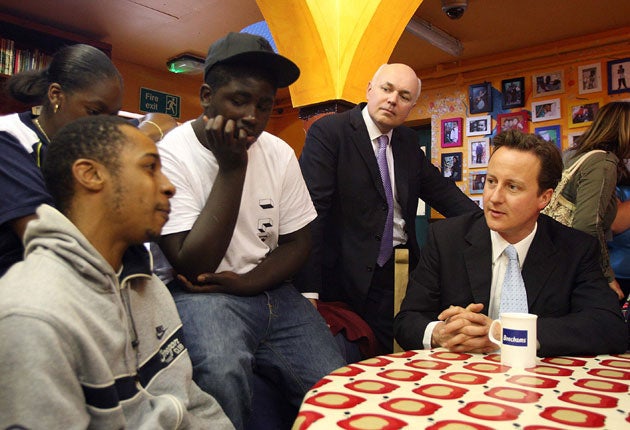Julian Knight: Throw young rioters to the lions? I'd rather we trained our teenagers

Nouveaux Nazis is what I call them. People who espoused right-on liberal views last week but post riots want the return of the cane and National Service, just for starters.
Housing minister Grant Shapps jumped on this white transit van, promising to evict rioters – and presumably their families – from council homes. It's the sort of action which would be approved by the listeners to TalkSport – reportedly someone rang in and suggested the London Zoo lions be released on the rioters.
But taking council houses away will only mean that we completely exclude these people from society and hurt those they live with who may have done nothing wrong. Long term it's clearly counterproductive and will create more crime and disorder.
However, this doesn't mean the riots don't tell us important things about welfare provision. In certain circumstances, not having a job pays more than being in work, being a single parent pays more than being a couple – and I'm not having a go at single parents as I'm the product of one. But work has to pay and that's what Work and Pensions Secretary Iain Duncan Smith's welfare reforms are all about. They will cost lots of money at a time when we don't have it, and there will be individual cases of unfairness, but, as we have seen this week, the cost of doing nothing is far greater.
The choice of Mr Duncan Smith to draw up the Government's long-term social response to the riots is significant because it may mean that many of the welfare reforms that didn't make the Treasury cut a few months ago will be back in play. I'd like to throw my two pennies' worth in here – it doesn't involve lions – and suggest we introduce something akin to the 1980s-style youth training scheme for 16-year-olds to get them into the discipline of work. For those looking to progress into the sixth form and beyond, they should do a year's part-time work in the community in return for government vouchers which can be used to claim a year's free university tuition, part of the deposit on a home, or even a first car.
Mortgage revival
It's ironic that in a week when the nerves of markets and investors have been strained to near breaking point, and the solvency of some of Europe's biggest governments and banks is once again coming under heavy scrutiny, we have seen yet more loosening in the UK mortgage lending market.
The prices of fixed-rate deals have continued to drop, partly off the back of spreading expectations that we won't see Bank of England interest rates rise before 2013. Very long-term fixed rates – more than five years – which have been shunned in the past by UK borrowers, may soon be coming back to market, with one of the UK's very biggest lenders looking at launching 10-year or even 25-year fixed-rate deals.
Meanwhile, the 100 per cent mortgage deal – presumed dead and buried by the credit crunch – is just starting to creep back. An interesting variant on the 100 per cent deal has been launched by the Marsden and the Tipton & Coseley building societies; this involves family members securing the deal through their own property or putting a separate pot of cash in a deposit account. And there is once again a massive choice in buy-to-let mortgages as lenders cotton on to the fact that defaults in the sector are very low, and that if large numbers of people can't afford to buy they will rent – thus forcing up yields.
However, enjoy this Indian summer in the mortgage market while it lasts, because if the turmoil of recent weeks continues the deals will disappear as quickly as they arrived.
Get a free fractional share worth up to £100.
Capital at risk.
Terms and conditions apply.
ADVERTISEMENT
Get a free fractional share worth up to £100.
Capital at risk.
Terms and conditions apply.
ADVERTISEMENT
Beware Bulgaria
This is a property story which filled me with dread. According to themovechannel.com, Bulgaria is making a comeback for British people looking to buy abroad. For the first time in three years, Bulgaria features in the top 10 destinations for British buyers, the site said.
Perhaps it's because Bulgaria is outside the eurozone and is relatively cheap that it's on the way back into favour? But as far as Bulgarian property is concerned I'm reminded of the saying: Fool me once, shame on you; fool me twice, shame on me.
Even before the financial crisis of 2008, it was clear that there was something badly wrong with buying in Bulgaria – developers selling property on land they didn't own; running off with people's deposits; sub-standard construction; no services connected to properties – all occurred.
And for those who did actually get to move in, they often found that promises of double-digit guaranteed rental income from the developers were worthless. Basically, virtually any property horror story involving corruption you could ever associate with property development and purchase was writ large in Bulgaria.
Of course, some may say it is now a buying opportunity, and that if you know what you're doing you can pick up property in some stunning locations at a fraction of the cost the original owners paid. But just because something is cheap doesn't mean it is either a bargain or any good. With Bulgaria, don't be fooled.
Join our commenting forum
Join thought-provoking conversations, follow other Independent readers and see their replies
Comments
Bookmark popover
Removed from bookmarks